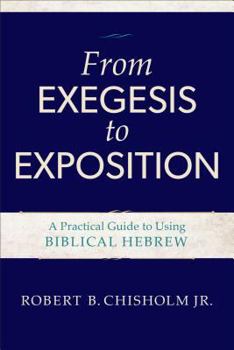From Exegesis to Exposition: A Practical Guide to Using Biblical Hebrew
Select Format
Select Condition 
Book Overview
Inspires and instructs students and pastors to use the Hebrew Bible appropriately in their preaching and teaching. Includes sample sermons and lessons. This description may be from another edition of this product.
Format:Paperback
Language:English
ISBN:0801021715
ISBN13:9780801021718
Release Date:May 1999
Publisher:Baker Academic
Length:304 Pages
Weight:0.05 lbs.
Dimensions:0.6" x 6.0" x 8.9"
Customer Reviews
4 ratings
Great intro to Hebrew exegesis
Published by Thriftbooks.com User , 15 years ago
This book is great for a person looking to effectively use Hebrew while studying the Torah, Prophets, and Other writings. The process is worth the time.
Outstanding Practical Intro to Hebrew Exegesis
Published by Thriftbooks.com User , 19 years ago
I have used this book as an aid to Hebrew exegesis now for two different courses, and I have found that it is perfect for the intermediate Hebrew student: not too technical and not too dumbed-down. I knew enough about grammar to understand the terms, but I still needed a fair amount of help after basic Hebrew grammar. Chisholm's book pointed me in the right direction for third semester Hebrew. Other books that I have used were way over my head, but this one was written for my level. Dr. Chisholm is a seminary professor with over 25 years of experience in teaching beginning,intermediate and advanced students. He knows exactly what each level needs, and this book was designed precisely for the third semester student. It can also be used for a refresher for advanced students as well. I took a couple of courses from Dr. Chisholm, and I can attest that his classes are even better than his books, if that can be imagined!
Bridging the Gap Between Biblical Languages and Ministry
Published by Thriftbooks.com User , 23 years ago
In laying the foundation to his basic thesis, Chisholm elaborated on what is probably the quintessential paradigm for pulpit ministry: mastery of the ancient text. It is unfortunate that many language professors do not incorporate active learning techniques to help students make the crucial connections and applications of the languages, nor do they attempt to relate it to the importance and credibility of practical ministry. There is most likely too much assuming on the part of the professors. They think the students will naturally make the proper cognitive connections, but as Chisholm stated, "Many students come away from the process weary" (9). Chisholm rightly states that knowledge of the ancient text is essential for those who preach and teach God's Word (7). In building on his theme, Chisholm supports his claim by relating it to the overall background of proper hermeneutical processes, or in his words, proper "exegesis" (11). A fundamental principle of hermeneutics is the study of backgrounds, which includes geography, manners and customs, archaeology, language, as well as other related subjects. It is important to realize that the text is grounded to the historical-cultural context, which is inextricably connected to its meaning (151). The point he makes relates not only to discerning the "text," but also understanding the "context." "What did the text mean to the original audience?" is a necessary question in proper exegesis, and goes against the ever-popular Reader-Oriented techniques (150) employed by many preachers today. This leaves the message devoid of biblical authority and the audiences are left spiritually malnourished! I found it particularly interesting that even the Bible invites the reader to step into the original text by employing the interjection "hineh" (look) in many of its passages (160), thus illustrating the point of putting oneself into the shoes of the biblical characters. This is a fundamental key to unlocking the meaning of the text. The book achieves its purpose on two levels. First, Chisholm focuses on the mechanics or building blocks of the Hebrew language, such as syntax, pronouns, verbs, in addition to semantics and such. Secondly, he deals with the field of linguistics and how one should understand narrative, poetry, anthropomorphisms, prophecy and the like. Chisholm refers to the latter as "beneath the surface" interpretation (149). Chisholm makes a convincing approach that a mastery of the Hebrew language (and linguistics in general) is imperative for any preaching-teaching ministry and is inextricably connected to "truly biblical" preaching-teaching (223). Of course, Chisholm does point out that multiple perspectives on a passage are okay (224). He is really referring to application, for applications can widely vary and are sometimes a personal issue. But the preacher must never force a modern issue or theme on the ancient text if it does not re
A good book
Published by Thriftbooks.com User , 23 years ago
This is a good book to study biblical hebrew and theaching biblical theology in the church and in the society.




